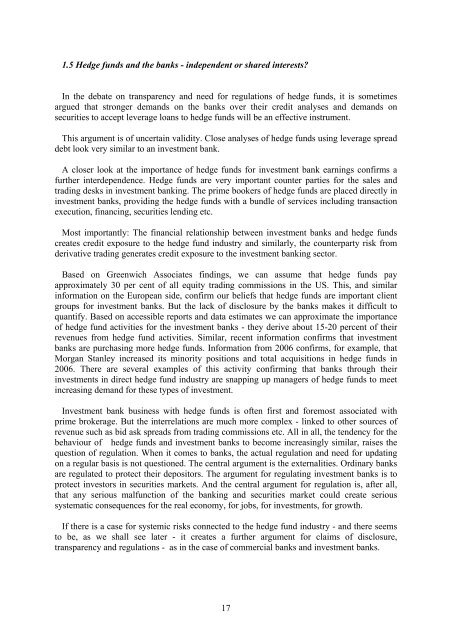Executive summary - Udo Bullmann
Executive summary - Udo Bullmann
Executive summary - Udo Bullmann
- No tags were found...
You also want an ePaper? Increase the reach of your titles
YUMPU automatically turns print PDFs into web optimized ePapers that Google loves.
1.5 Hedge funds and the banks - independent or shared interests?In the debate on transparency and need for regulations of hedge funds, it is sometimesargued that stronger demands on the banks over their credit analyses and demands onsecurities to accept leverage loans to hedge funds will be an effective instrument.This argument is of uncertain validity. Close analyses of hedge funds using leverage spreaddebt look very similar to an investment bank.A closer look at the importance of hedge funds for investment bank earnings confirms afurther interdependence. Hedge funds are very important counter parties for the sales andtrading desks in investment banking. The prime bookers of hedge funds are placed directly ininvestment banks, providing the hedge funds with a bundle of services including transactionexecution, financing, securities lending etc.Most importantly: The financial relationship between investment banks and hedge fundscreates credit exposure to the hedge fund industry and similarly, the counterparty risk fromderivative trading generates credit exposure to the investment banking sector.Based on Greenwich Associates findings, we can assume that hedge funds payapproximately 30 per cent of all equity trading commissions in the US. This, and similarinformation on the European side, confirm our beliefs that hedge funds are important clientgroups for investment banks. But the lack of disclosure by the banks makes it difficult toquantify. Based on accessible reports and data estimates we can approximate the importanceof hedge fund activities for the investment banks - they derive about 15-20 percent of theirrevenues from hedge fund activities. Similar, recent information confirms that investmentbanks are purchasing more hedge funds. Information from 2006 confirms, for example, thatMorgan Stanley increased its minority positions and total acquisitions in hedge funds in2006. There are several examples of this activity confirming that banks through theirinvestments in direct hedge fund industry are snapping up managers of hedge funds to meetincreasing demand for these types of investment.Investment bank business with hedge funds is often first and foremost associated withprime brokerage. But the interrelations are much more complex - linked to other sources ofrevenue such as bid ask spreads from trading commissions etc. All in all, the tendency for thebehaviour of hedge funds and investment banks to become increasingly similar, raises thequestion of regulation. When it comes to banks, the actual regulation and need for updatingon a regular basis is not questioned. The central argument is the externalities. Ordinary banksare regulated to protect their depositors. The argument for regulating investment banks is toprotect investors in securities markets. And the central argument for regulation is, after all,that any serious malfunction of the banking and securities market could create serioussystematic consequences for the real economy, for jobs, for investments, for growth.If there is a case for systemic risks connected to the hedge fund industry - and there seemsto be, as we shall see later - it creates a further argument for claims of disclosure,transparency and regulations - as in the case of commercial banks and investment banks.17





